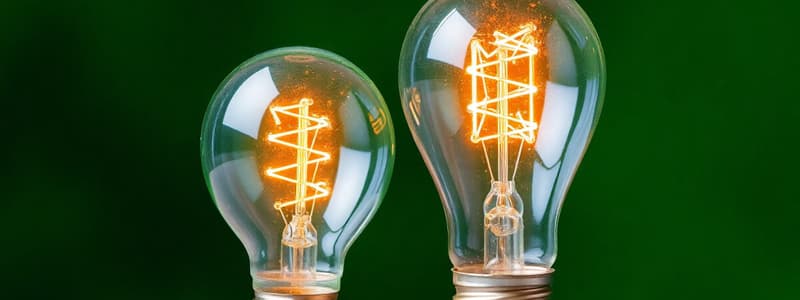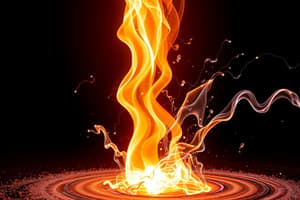Podcast
Questions and Answers
What is a characteristic of renewable resources?
What is a characteristic of renewable resources?
- They cannot be replenished naturally.
- They contribute significantly to climate change.
- They include solar, wind, and geothermal energy. (correct)
- They are formed over millions of years.
Which of the following best describes energy efficiency?
Which of the following best describes energy efficiency?
- The production of energy from non-renewable resources.
- The process of generating energy from fossil fuels.
- The total amount of energy consumed regardless of the outcome.
- The effectiveness of energy use to achieve a desired result. (correct)
What is one benefit of improving energy efficiency?
What is one benefit of improving energy efficiency?
- It increases the cost of energy production.
- It promotes the use of non-renewable energy sources.
- It decreases reliance on renewable sources.
- It potentially reduces energy consumption and environmental impact. (correct)
Which statement is true regarding non-renewable resources?
Which statement is true regarding non-renewable resources?
What role does technology play in energy production?
What role does technology play in energy production?
What is the primary reason energy transformations are not always 100% efficient?
What is the primary reason energy transformations are not always 100% efficient?
Which type of energy is associated with the position of an object?
Which type of energy is associated with the position of an object?
Which of the following describes chemical energy?
Which of the following describes chemical energy?
Which of the following forms of energy travels in waves?
Which of the following forms of energy travels in waves?
What is the SI unit for measuring energy?
What is the SI unit for measuring energy?
What does the law of conservation of energy state?
What does the law of conservation of energy state?
Which type of energy is stored in the nucleus of an atom?
Which type of energy is stored in the nucleus of an atom?
What process describes the transfer of heat through a solid material?
What process describes the transfer of heat through a solid material?
Flashcards
Renewable energy
Renewable energy
Resources that can be replenished naturally, such as solar, wind, hydro and geothermal.
Non-renewable energy
Non-renewable energy
Resources that are finite and take millions of years to form, such as fossil fuels (coal, oil, and natural gas) and nuclear fuels.
Energy efficiency
Energy efficiency
How effectively energy is used to produce a desired outcome.
Energy impacts the environment
Energy impacts the environment
Signup and view all the flashcards
Technology and energy
Technology and energy
Signup and view all the flashcards
What is energy?
What is energy?
Signup and view all the flashcards
Law of Conservation of Energy
Law of Conservation of Energy
Signup and view all the flashcards
Kinetic Energy
Kinetic Energy
Signup and view all the flashcards
Potential Energy
Potential Energy
Signup and view all the flashcards
Thermal Energy
Thermal Energy
Signup and view all the flashcards
Electromagnetic Energy
Electromagnetic Energy
Signup and view all the flashcards
Chemical Energy
Chemical Energy
Signup and view all the flashcards
Nuclear Energy
Nuclear Energy
Signup and view all the flashcards
Study Notes
Scientific Study of Energy
- Energy is the capacity to do work. It exists in various forms, including kinetic (energy of motion), potential (stored energy), thermal (heat), electromagnetic (light), chemical, nuclear, and sound.
- The law of conservation of energy states that energy cannot be created or destroyed, only transformed from one form to another.
- Different forms of energy can be converted into other forms, with some transformations being more efficient than others. Converting chemical energy to mechanical energy, as in a car engine, is less than 100% efficient; some energy is lost as heat.
Types of Energy
- Kinetic Energy: The energy of motion. Greater speed and mass mean greater kinetic energy.
- Potential Energy: Stored energy due to position, shape, or condition. Examples: gravitational (height), elastic (stretched spring), chemical (chemical bonds).
- Thermal Energy: Internal energy of an object from molecular kinetic energy. Higher temperature means higher thermal energy.
- Electromagnetic Energy: Energy traveling in waves, including light, radio waves, microwaves, X-rays, and ultraviolet radiation. Different types have different wavelengths and frequencies.
- Chemical Energy: Energy stored in atomic and molecular bonds. Reactions breaking or forming bonds release or absorb energy.
- Nuclear Energy: Energy stored in the atom's nucleus. Nuclear reactions (fission and fusion) release massive amounts of energy.
- Sound Energy: Energy transmitted through vibrations.
Energy Transfer and Transformations
- Energy is constantly transferred and transformed. Heat transfer occurs through conduction, convection, and radiation.
- Energy transformations are crucial to all processes in the universe. Organisms transform food energy into energy for growth, movement, and functions.
Units of Energy
- The standard unit for energy in the International System of Units (SI) is the joule (J).
- Other units like calories, kilowatt-hours, and British thermal units (BTU) are commonly used.
Energy Resources
- Energy resources are classified as renewable or non-renewable.
- Renewable resources: Solar, wind, hydro, and geothermal energy can be naturally replenished.
- Non-renewable resources: Fossil fuels (coal, oil, natural gas) and nuclear fuels are limited and take millions of years to form.
Energy Efficiency
- Energy efficiency is how effectively energy is used to produce a desired outcome.
- Improving energy efficiency reduces consumption and environmental impact (e.g., insulation, energy-efficient appliances).
Energy and the Environment
- Many energy sources have environmental impacts, contributing to climate change.
- Renewable energy sources are crucial for sustainable energy systems.
Energy and Technology
- Technology constantly improves energy production, storage, and use.
- New technologies focus on energy efficiency and renewable energy sources.
Studying That Suits You
Use AI to generate personalized quizzes and flashcards to suit your learning preferences.




